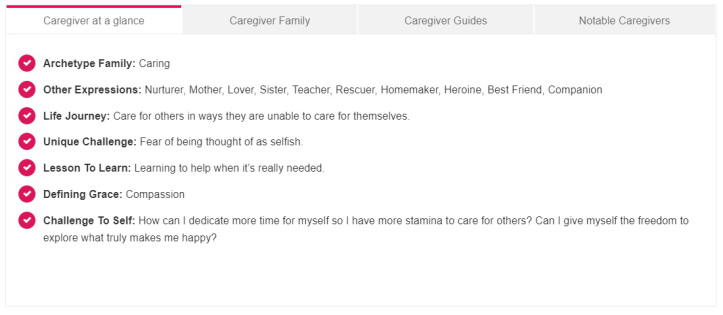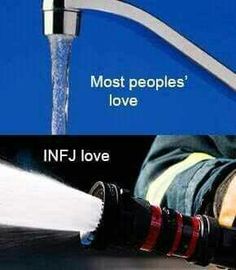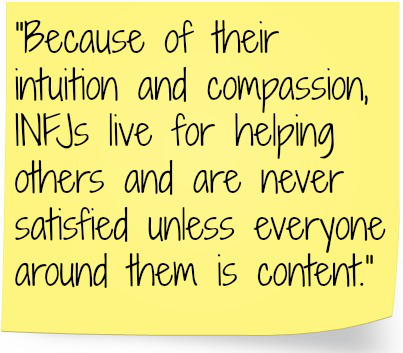One of my greatest passions in life is the study of personalities. It started back when I first did an online Myers-Briggs test at 13 and got the INFP type, only to return 3 years later to the same test to get INTJ. At 17, my school paid for all students to take the official Myers-Briggs and that time, I ended up with INFJ.
Back then, I wondered to myself – “I don’t think I have changed definitively as a person, despite having aged – in my core, I still remain the same person. So why the differences in results?”
Then began my delve into the Myers-Briggs test, which led to a full reading of the psychoanalyst, Carl Jung’s works. I have studied anything from the Horoscope and Birth Charts, which dismiss personality as something decided upon birth, to socionics and the original Myers-Brigg’s theory as designed by Carl Jung.
However, I will talk about my interest in a separate rambling post. This post is meant for the study of the ‘Caregiver’ type in the Archetype test. The test is a simplified (albeit, overly so) version of Jungian archetypes. Carl Jung identified 12 ‘archetypes’ – character models which help shape our personality and which we aspire to be. My Archetype is the ‘Caregiver’.

I decided to address my Archetype first, out of all other personality tests, because of that one heading in the list – “Unique Challenge: Fear of being thought of as selfish”. It immediately caught my interest because of its impeccable accuracy – I am, indeed, terrified of being perceived as being selfish, by both others and myself. In fact, it is possible to trace the greatest threat to my success as an individual – my dangerous self-deprecating nature – to the fear of being thought of selfish.
At this point, I might introduce the term Barnum’s effect.
Barnum’s effect, also known as Forer’s effect, is a psychological phenomenon explaining why specific events can be construed as truths. It applies to Daily Horoscope predictions. In general, what the effect theorises is that individuals will give high accuracy ratings to descriptions of their personality that are supposedly tailored to them, but are, in fact, vague enough to apply to a general public.
The term will be important in analysing all the personality tests I will cover, because every time I assert that something is ‘accurate’, I will seek to reject Barnum’s effect as a possible cause first.
For Jungian’s Archetypes, the Barnum’s effect is easily rejected, because the Unique Challenges are…well, very unique. I can think of few people I know – less than a handful – who would agree with me that the thought of being perceived as selfish can be considered a fear.
As follows, the Lesson to Learn is also unique, being that I must learn to help with it’s really needed. This ties in to how I can be perceived as an overbearing person, when, in reality, the term ‘overbearing’ is the negative connotation for being caring. Think of it this way – You show care for your friends by being there for them constantly; but if that person does not truly consider you a friend, you presence is ‘overbearing’. It took me a long time to figure that out because it is my unique Lesson to Learn – something that may come as common sense to others, but takes a while for me to understand.
I will now discuss the headings separately, which may be translated to bored ramblings.
1. Archetypal Family – Caring
In other words, I am an individual whose primary focus in life is to care for others. Who these ‘others’ may be could differ from Caregiver to Caregiver, but the constancy lies in that ‘we care’. It is not difficult to see how this is both our strength and weakness.
Take for example this experience:
My friend returned from Christmas break a week ago and through communicating with her over text, I know that she hasn’t physically met anyone for a week. I am busy with work and studies, so I am quite occupied. Furthermore, she lives 40 minutes away and the only way I can get there is by walking. She calls me one afternoon telling me that she’s lonely and feeling depressed. I immediately closed the textbook I was reading, put on my jacket and left the house. On the way, I got a box of chocolates, with almonds, because they are her favourite, and a tub of her favourite ice-cream. Keep in mind, I had work to submit the next day.
Now, this event to me is something that comes naturally. I called my mother a few days later and told her about it. What highlighted this event was how she reacted to it – she thought it ridiculous to drop something academically crucial just to comfort a friend who was ‘lonely’. In her words, “your friend isn’t dying or in any dangerous situation; it makes no sense for you to make that much effort, especially when you’re busy”.
Yes, it has always been apparent that I am unique in my family for being that sort of person to literally drop everything to go help someone – friend, family or even stranger. It’s a cause of worry for them because of how often I get taken advantage of – and I am even aware when it happens. To many of them, who are pragmatists and believe in prioritising the self, it makes no sense why I would allow someone to manipulate me when I know they are doing it. Well…if it helps them, why not?
2. Other Expressions: Nurturer, Mother, Lover, Sister, Teacher, Rescuer, Homemaker, Heroine, Best Friend, Companion
Let me say which ones of these I’m not first – Mother and Homemaker. This is probably the difference between xSFJs and xNFJs. I will go into more detail about these in posts about Myers-Briggs. In short, xSFJs and xNFJs are both likely to be Caregiver types because they are service-oriented. However, xSFJs have a tendency towards practical care while xNFJs are more likely to engage in emotional and spiritual care. It is not to say that one cannot do the other. It is simply a tendency towards.
When it comes to taking practical care of others, yes, I am interested in doing so, but I am not exactly proficient myself. I can cook enough to be alive and do enough housework to not be living in a dump, but I lack the confidence in my ability to take care of others in the same way.
I am definitely the Lover, Sister, Teacher, Best Friend and Companion.
Of course, Lover here is taken to mean ‘someone who gives love’. As INFJs come, we tend to be colder than the other FJs, but there was always this joke about how INFJs show love – we don’t understand what it means to love in moderation. We douse you in it and it can be easily perceived as overbearing.

I often play both the Sister and Teacher roles with friends, depending on which friend it is. It’s a complicated thing being an INFJ – because we have something known as the ‘chameleon effect’. We tend to adapt to situations and people, simply because we dislike conflict and value harmony. As a result, we can be perceived as ‘fake’, because of how different we act with person to person. With a person who is shy and meek, I often find myself becoming somewhat of a guardian and protector. With someone who needs me to teach them something, I end up transforming into a teacher – and I’ve been told I’m really good.
Best Friend and Companion is a given too. I cannot even remember the last time I haven’t finished an argument in my head with ‘it must be my fault’. I often want to be the person who gives a lot in a friendship and who go out of her way to make someone happy. As a result, I’ve been told by several of my close friends that I am their ‘best friend’…which leaves me stunned and speechless, and an extremely stupid look on my face.
3. Unique Challenge: The fear of being thought of as selfish
Ah, here we are, establishing the reason why I am so self-deprecating. It is simple, really. It is impossible to become a selfish person if I inherently treasure myself less than I treasure others. If I consider myself as being ‘less’ than everyone else, then I can maintain humility and avoid developing an ego. It was a good plan, of course, until it led to years of depression. I do realise now that I have to love myself, but even with that development, I still often ask myself whether I’ve crossed the line into being selfish.
You see, when a person starts taking care of themselves, there is tendency of going over the line and becoming self-absorbed. If you fail to catch yourself at that stage, it can rot into a state of neglecting others for the sake of yourself. You can become selfish, simply because a situation that benefits another can cause some hindrance to yourself. So, as I try to become more confidence and love myself more, I continue to ask myself “When I am taking care of myself, have I managed to reduce the care I can give to others?”
I don’t want to be thought of as selfish because of my purpose in life. I believe that my purpose in life, as should be everyone’s purpose in life, is to make the world a better place than when you entered it. If you manage to improve the lives around you while leaving, your accomplishments in life develop a life of their own beyond your death. So…in the end, is it not still a selfish pursuit?
This has troubled me endlessly as a child – is there a way to be selfless? When I donate money to the poor, isn’t it also because it makes me feel generous? Of course, I can’t question that as a child until now and not have an answer. The answer is: Pure selflessness is impossible, unless you can prevent yourself from all benefits; however, should you maximise the benefit you bring to others in proportion to that of yourself, you can consider yourself ‘selfless’.
4. Lesson to Learn: Learning to help when it’s really needed

Ah, ‘overbearing’? I do believe I have to learnt the above lesson. Currently, in my opinion, friendship is something that is validated by actions and not words. Loyalty cannot be sworn upon like servitude to a King. Instead, it is acted upon and shown through actions. In other words, don’t promise me your loyalty – if I have it, I will know it.
It did take me a while to realise it though. I need to reserve my energy and time for people who deserve it, or people who show that they desire them. In other words, if, as an INFJ with powerful intuition, I feel like we are not friends, or you do not need my friendship, then it is best that I do not offer the same help I offer to my true friends. It goes from offering a listening ear to physically doing something. To put it in less complicated words – I should not make myself available to someone who is never coming to visit.
5. Defining Grace: Compassion
I don’t really consider myself to be a compassionate person. Sure, I may be better than some people I know, but as I have been taught by my mother – “You compare with those better than you, not those below you. If you look down, you will fall.” Well, she doesn’t nag, so she relayed that over a few short scoldings consisting of a few seconds each. I would say, it’s better than the at-least-an-hour scolding my dad does.
Anyway, if you compared me to my sister, who would kick a cat for scratching her – yes, I am more compassionate to an extent. However, I can also resort to cold-hard logic sometime, because I am aware that I am an emotional person. I can be quite merciless if someone pushes me to my limits, but it takes very long to get there. I have a very long fuse, with a gigantic bomb at the end. The fuse is also quite quiet, so you won’t ever see the explosion coming. In fact, in my life right now, there is someone dangerous close to the famous INFJ doorslam, but I don’t think he is aware.
All in all, I don’t consider myself to be compassionate, although my friends argue otherwise. My anger is the type that makes you regret your life decisions – and it’s too late to do so.

6. Challenge to Self: How can I dedicate more time for myself so I have more stamina to care for others? Can I give myself the freedom to explore what truly makes me happy?
This is an appropriate place to end the post, because these are ultimately the questions I need to ask myself. I want to be selfless and always consider others before myself. The risk of that is losing and neglecting my own needs. However, needs and desires ride that fine line that is often blurred. If I switch to prioritising my own needs, I risk becoming selfish – and that’s the last thing I want to be as an individual. In other words, I can fail at everything else and still feel like being alive has a purpose, but the moment I am and only can be a selfish person, my life loses all meaning – if my existence benefits only myself, then the net result of my life on humanity is a loss. It does make sense.
Share this:




